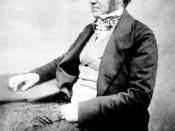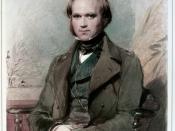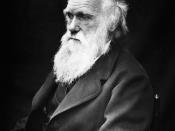Very possibly no other author in the nineteenth century influenced human thought all around the world more than Charles Darwin when he published his The Origin of Species. Even though there were many views of evolution that were proposed in the eighteenth and nineteenth centuries, for example Lamarck and Cuvier of France, it was Darwin's theory of natural selection that was eventually accepted as how nature runs its course. Darwin's theory that natural selection is responsible for evolutionary change was a radical departure from the dominant religious and social climate of Western Culture when introduced to the public in 1859.
Darwin did not come up with his theory of natural selection overnight. It took most of his life prior to 1859 to come up with the basis for the theory. Darwin's experiences during his voyage on the HMS Beagle provided much of the background for his idea that new species originate from ancestral forms by the gradual accumulations of adaptations.
Natural selection is based on differential success in reproduction, made possible because of heritable variation among the individuals of any population and the tendency for a population to produce many more offspring than the environment can support. This concept was drawn from the basic works of Thomas Malthus who suggested that there is a struggle for existence in human populations between the growth factor and the rate of growth of food for the human population.
Another factor that helped Darwin in his research in developing natural selection was that evolution is validated by evidence from homologies, similarities between species that are due to a common ancestry. The fossil record generally supports the evolutionary deductions based on homologies. One other major component of Darwin's theory was drawn from his good friend Charles Lyell. In Lyell's famous work Principles of Geology...


